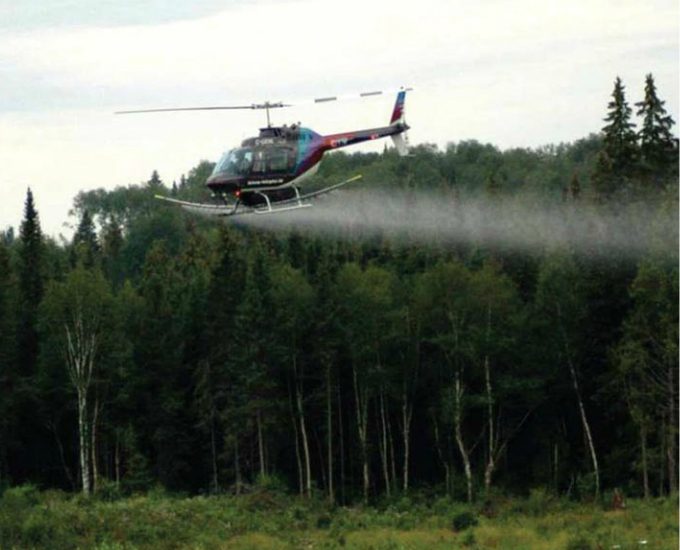
KJIPUKTUK (Halifax) – Clearcutting and spraying are killing the land and the entire ecosystem in Nova Scotia. It is about the death of bees, butterflies, birds, fish, endangered species, animals, trees and yes, humans.
Along with spraying, glyphosate happens to be in most of the foods at our supermarket. If it doesn’t say non-spray or organic, the product most likely contains glyphosate. In 1996, Monsanto released its first genetically modified (GMO) seeds that can tolerate being sprayed with Roundup. Roundup application surged as farmers broadly adopted these “Roundup Ready” GMO seeds and the accompanying herbicide they were designed to tolerate. Most farmers in Nova Scotia apply Roundup to control weeds. Companies like Oxford Frozen Foods use it freely.
As consumers, we should be demanding clean food. A solution may be to ask your local grocery store to keep a supply of non-spray or organic foods. We have the right to demand clean food. It can be done. The government should be offering incentives to our farmers to get away from dirty food sprayed with glyphosate. We are worth it and we deserve it.
Over two years ago, our government cried out to William Lahey to do an Independent Review of Forest Practices in Nova Scotia. They knew we were in trouble so they reached out. William Lahey came up with a plan. In Lahey’s words, he basically said, there is too much clear-cutting happening where it should not be happening, and the consequences of that is a continuing reduction in the proper functioning of the ecosystems and the biodiversity that are dependent on our forestry. The Lahey report recommended reducing clearcutting from 65% of all harvesting on Crown land to between 20 and 25%.
Now over two years after the recommendation to reduce clear-cutting, nothing has happened. As a matter of fact, since then, more clear-cutting is going on than before. They just took out the word clear-cut and replaced that with the words variable retention 10% or 20% to make it sound better and to fool the general public. It actually means they are removing 90% or 80% of the trees. Along with this, they removed the older clear-cuts off of the Harvest Viewer Map, so people could no longer see the destruction. Transparency with this government is nil in every sense of the word. They do everything they can in their power to keep us in the dark.
The Lahey report also recommended High Production Forestry. Which means plantations like Irving has in New Brunswick. With the recommendation of plantations comes the plan to spray even more glyphosate that kills off all the hardwoods, maples, underbrush, grasses etc., so that only softwood would grow. This puts glyphosate in our air, our water, our soil and they plan to do this on a regular basis. They are planning to convert 330,000 hectares or around 600,000 football fields of forest. This is substantial with concerns about runoff into wetlands, water systems and water tables.
In 2010/2011, Nova Scotia’s Framework for Forestry and The Natural Resources Strategy stated that “public support will no longer be extended to the use of herbicides.” This means that taxpayer dollars would no longer be used to subsidize forestry herbicide spraying. Now that the government has abandoned its commitments to reduce clearcutting and other harmful practices, it appears that they may be preparing to once again make taxpayers pay for an herbicide-spraying program that they don’t want.
There are consequences to consider when changing land cover types. People want to plant trees to help with carbon sequestration and climate change, but sometimes, when you do that and you plant a lot of fast-growing trees that are a uniform species and age, you’re lowering the biodiversity and you’re also homogenizing the water cycle. That basically means you’re narrowing the range and response of the water cycle, and it makes it more susceptible to stressors like climate change.
Water is the world’s #1 resource, we should not be messing around with our water supply in any way. We should be protecting our water with all available resources. It needs to be made clear that clear-cutting and glyphosate application is killing our land and contaminating our water and needs to be banned. Our provincial government has the power to do that. Reach out to the provincial government and tell them you have had enough.
A little bit of good news is in the last three weeks all approved sprays for this fall have been halted by citizens of this province occupying the land and educating neighbors on the dangers of glyphosate.
The cycle of clearcutting and spraying is toxic to the whole environment and it needs to stop. We all need to stand together and demand a change in the forestry habits of this province. We need to demand change if there is to be a healthy province to pass down to future generations. We need the provincial government to listen when we say you need to stop spraying and clearcutting in this province. Your promises of reform are not working anymore. We need forestry that restores our lands, stores carbon and creates more jobs. The plans for plantations will only provide in the future at the most 11 jobs.
Clearcutting and spraying belong to a lazy, toxic forestry we can’t afford anymore. Citizens standing up together can successfully demand change. We want the provincial government to listen when we say: stop spraying and clearcutting Nova Scotia. Stop stringing us along with promises of reform. We’ve had enough. We need forestry that restores nature, stores carbon and creates jobs.
Sydnee McKay is an active member of the Stop Spraying and Clear-cutting Facebook group.
With a special thanks to our generous donors who make publication of the Nova Scotia Advocate possible.
Subscribe to the Nova Scotia Advocate weekly digest and never miss an article again. It’s free!



